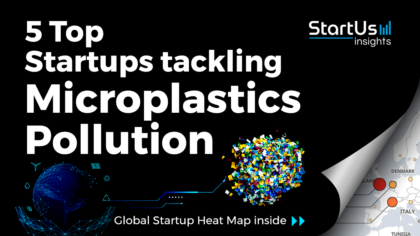Staying ahead of the technology curve means strengthening your competitive advantage. That is why we give you data-driven innovation insights. This time, you get to discover 5 hand-picked startups tackling microplastics pollution.
Global Startup Heat Map highlights 5 Top Startups tackling Microplastics Pollution out of 268
The insights of this data-driven analysis are derived from the Big Data & Artificial Intelligence-powered StartUs Insights Discovery Platform, covering 2.093.000+ startups & scaleups globally. The platform gives you an exhaustive overview of emerging technologies & relevant startups within a specific field in just a few clicks.
The Global Startup Heat Map below reveals the distribution of the 268 exemplary startups & scaleups we analyzed for this research. Further, it highlights 5 sustainable startups that we hand-picked based on criteria such as founding year, location, funding raised, and more. You get to explore the solutions of these 5 startups & scaleups in this report. For insights on the other 263 startups tackling microplastics pollution, get in touch.
PlanetCare develops Microplastics Filters
During each wash, clothes release microfibers that enter the sewer systems and, subsequently, often end up in nearby water bodies. However, microfiber filtration systems reduce the number of microplastics from polyester and acrylic materials in the effluent. Attached to the washing machine’s discharge system, these filters collect microfibers into dispensable cartridges. Startups develop microplastic filters for both domestic and commercial applications.
Slovenian startup PlanetCare offers microfiber filtration systems for laundries, hotels, and sports facilities, as well as for households. When installed into a washing machine, the startup’s filter prevents up to 90% of microfibers from entering the wastewater. Additionally, the startup is developing a built-in fiber filter, allowing manufacturers to produce more sustainable washing machines.
Iron Roots offers Microplastic-free Sports Apparel
Nowadays, most activewear clothes are made from synthetic materials. Moreover, fast fashion trends also influence sports apparel manufacturing, prioritizing the volume of sportswear production over the quality of material used. This, in turn, increases the number of microplastics released into water bodies from machine washing of sports apparel. Therefore, aiming to increase the sustainability of the sports fashion industry, startups develop activewear from organic materials such as cotton, hemp, and linen.
Dutch startup Iron Roots produces microplastics-free sports apparel. In its sportswear, the startup uses hemp and cotton, as well as fabrics made from eucalyptus and beech trees. By refraining from the use of polyester and nylon, among other plastics, Iron Roots reduces microplastics pollution produced by the sportswear industry. Moreover, the use of hemp and cotton also enhances sports apparel with antibacterial and antistatic properties.
Matter. works on Microplastics Capture Solutions
Microplastics are generated in multiple ways, for instance from abrasions during washing, exposure of plastics to environmental factors, and friction during vehicle movement. The collection of microplastics at the source enables efficient microplastics recycling and reuse. Therefore, startups research and develop filtering and collection systems for the textile industry, as well as for commercial and industrial settings that involve vehicle movements.
British startup Matter. develops microplastics capture and harvesting solutions. The startup produces filtration systems that aggregate microplastics at the source for further reuse and recycling. Matter. works on R&D, feasibility programs, and consultancy for sludge and wastewater treatment plants, washing machine manufacturers, commercial sites, dye houses, and textile manufacturers.
ECOFARIO offers a Wastewater Microplastics Removal System
Wastewater treatment facilities remove pollutants, such as microplastics from clothes and personal care products, to make the water suitable for further utilization. However, current filtering technologies often fail to effectively remove microplastics during the treatment process because they are not designed to do that. To address this, startups develop separation technologies for sewage treatment plants (STP) that prevent microplastics from entering effluent streams.
German startup ECOFARIO develops microplastics removal systems for wastewater treatment plants. The startup’s High-G-Separator leverages hydrocyclone-based separation technology, which eliminates the need to use filter media for microplastics separation. Additionally, the startup develops a mobile pilot plant for technology demonstration at sewage treatment facilities.
Ocean Diagnostics advances Microplastics Sampling, Analysis, & Sensing
Since microplastics reach several microns in size, their identification and analysis require specific equipment. Moreover, scalable research of microplastics in the oceans requires easy to deploy, portable devices capable of collecting samples underwater. To facilitate microplastics research and data-driven decision-making for plastics legislation, startups work on devices and software for microplastics analytics.
Canadian startup Ocean Diagnostics works on microplastics sampling, analysis, and sensing solutions. The startup develops the Ascension depth sampler for underwater sample collection. Further, Ocean Diagnostics produces the Saturna system for visible microplastics imaging. Moreover, the startup is working on microplastics sensors for small particle identification and analysis. Ocean Diagnostics’ solutions allow researchers to advance microplastics science and empower citizen participation in microplastics research.
Discover more Sustainable Startups
Sustainable startups such as the examples highlighted in this report focus on the circular economy, plant-based packaging, and chemical recycling. While all of these technologies play a major role in advancing sustainability, they only represent the tip of the iceberg. To explore more sustainable technologies, simply get in touch to let us look into your areas of interest. For a more general overview, you can download our free Industry Innovation Reports to save your time and improve strategic decision-making.









